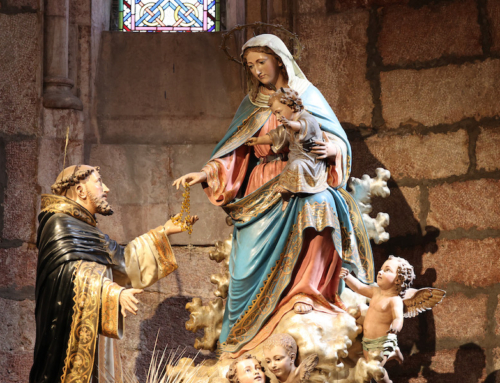Looking back over the last five semesters since I’ve begun my studies in philosophy and theology as a Dominican, I’ve noticed a distinct pattern in the way I choose to decompress after finals. My newfound free time seems to be divided between the odd combination of reading classical literature and writing computer programs. The first is not so uncommon around these parts and is part of a longer term effort to build up a part of my education that was neglected during my many years of studies in the hard sciences. The second is, I would guess, pretty odd, and a bit surprising even to me.
While I wouldn’t say I’m great at coding, I have a certain confidence that I can get the computer to do what I want it to do. For a given project and a given programming language, it’s a matter of using the right syntax and building the right structures so that the program runs as I intend it to. With the inevitable debugging process, it’s like a self-inflicted puzzle: figuring out all the specific areas in which your initial piece of code went wrong and wading through error messages until it comes out clean on the other side. There are consistent moments of accomplishment as each mistake is corrected and each bug overcome, although not without intervening periods of frustration. The satisfaction when it finally works in the end can also be quite rewarding.
Literature, on the other hand, is definitely not my forte, but that’s one of the reasons I spend time on it when I can. The enjoyment of literature is not so much about completing little tasks—although some of us can slip into that mindset at times—but about engaging with a story, a time, a place, a culture, an idea, an image, and letting it envelop you and sink in. When the writing is particularly good, it is an experience of joy. This experience is not always devoid of effort on the reader’s part, but the hard work has been done for us by the author. Still, I sometimes get the sneaking suspicion that I’m reading it wrongly, and this is particularly true in my forays into poetry.
The difficulty I have with poetry is that, because I know it’s deeper than a mere reading of the words on the page, I worry that I’m missing the full meaning. I can appreciate a poem in general, but I sometimes get the feeling that something didn’t sound right. After reading a book on the meter and form of poetry recommended by one of the brothers, I think part of my problem is that I was approaching a poem like a piece of computer code. I knew that, both by convention and by the intention of the author, there is a certain rhythm and structure to a poem, but, when I stopped to focus on it, it seemed like the poem never quite fit the pattern I thought it should. What I missed was that the meter and form are at the service of the poet, not the other way around.
A great poet must be a student of language, culture, and even physiology, understanding what certain forms and rhythms evoke in a reader. As a reader, my role is to read the poem as naturally as I can and let the language impact me. While a little knowledge and effort by the reader can help, it is the poet’s role to discern when to impose a certain form and when to purposely vary from it to elicit the desired reaction in the reader. A poem is not necessarily made better by “fixing” the metrical syntax and, in fact, adhering too closely to a given rhythm can feel forced and monotonous. The art of poetry is a gift earned at the cost of consistent effort and many false starts. It comes with the realization that what produces the desired effect is not an algorithm but a way of life that is imbued in language and rhythm—a rare gift indeed.
It will surprise no one to say that the spiritual life has much more in common with writing poetry than it does with writing code. Yet there are times when we can begin to think of prayer as an algorithm: that, when it’s done right, God will act just like we want him to. On the other hand, if done poorly, it’s not even worth trying because not only will it not work, but we’ll waste our time wading through layers of distraction and guilt to no avail. We’re better off setting it aside, fixing the problems, and coming back to prayer when we’ve got the algorithm just right.
Of course there are obstacles and difficulties in prayer, most especially our own sinfulness, but the solution to these problems is not to stop praying and figure out what we’re doing wrong. The solution, as always, is to continue to pray. We don’t pray better simply or always by tweaking the prayer until we get it right, but by imbuing our lives with a spirit of prayer. Most importantly, unlike both poetry and programming, we are not alone in the process, but have the help of Christ and his Church. We should constantly offer up our imperfect and unworthy prayers, allowing them to be accepted lovingly by our Lord Jesus Christ, and asking for the grace to pray more and more as He did, until one day we join all the angels and saints in their eternal hymn of praise.
✠
Image: Raphael, Poetry from the Stanza della Segnatura







